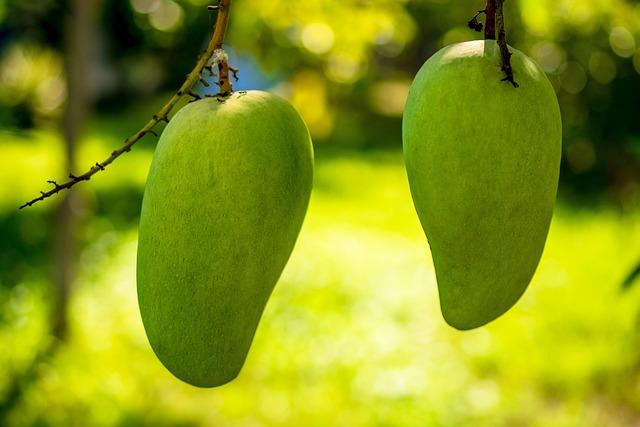unlocking the Secrets of Irvingia Gabonensis: A Closer Look at African Mango’s Role in Leptin Sensitivity and Fat Loss
In a world increasingly fascinated by natural remedies for weight management, Irvingia gabonensis, commonly known as African mango, has emerged as a remarkable contender. This tropical fruit,cherished not just for its exotic taste but also for its potential health benefits,is garnering attention for its intriguing relationship with leptin sensitivity—a key player in the body’s regulation of appetite and fat storage. As we delve into the science surrounding this powerful extract, we will explore how African mango may hold the key to enhancing metabolic function and promoting effective fat loss. Join us on a journey through the vibrant realms of nutrition, where tradition meets contemporary research, shedding light on the profound impact of Irvingia gabonensis and its role in achieving wellness and balance in our lives.
Understanding Irvingia Gabonensis and Its Role in Leptin Sensitivity
Irvingia gabonensis, commonly known as African mango, has garnered attention in the realm of weight loss and metabolic health, primarily due to its potential effects on leptin sensitivity.Leptin is a crucial hormone involved in regulating energy balance and appetite control. When the body develops resistance to leptin—a common issue in obesity—it can lead to difficulty in shedding excess weight. Research suggests that the compounds found in Irvingia gabonensis may enhance the body’s response to leptin, making it easier for individuals to manage hunger and intake levels. This improved sensitivity could potentially reverse some metabolic dysfunctions associated with obesity, fostering a healthier physiological state.
The fruit and seeds of Irvingia gabonensis are rich in fiber and essential nutrients, contributing further to their appeal as a weight management aid. The following benefits highlight its impact on leptin sensitivity and overall well-being:
- Increased Fiber Intake: Helps regulate hunger and promotes satiety.
- Blood Sugar Regulation: May improve insulin sensitivity, supporting metabolic health.
- Fat Cell Reduction: Initial studies indicate a potential decrease in fat cell volume, enhancing body composition.
Incorporating Irvingia gabonensis into a balanced diet, alongside regular physical activity, can enhance leptin function and may produce favorable outcomes for those looking to lose weight. To illustrate the relationship between leptin, Irvingia gabonensis, and weight loss, the following table summarizes key aspects:
| Aspect | Effect |
|---|---|
| Leptin Sensitivity | Enhanced response to appetite regulation |
| Weight Loss | Potential reduction in body fat |
| Glucose Metabolism | Improved insulin sensitivity |
The Science Behind Fat Loss: How Irvingia Gabonensis Influences Metabolism
Irvingia gabonensis, commonly known as African mango, may play a meaningful role in enhancing metabolic function and promoting fat loss. Research suggests that this tropical fruit can positively influence leptin sensitivity, a crucial factor in regulating appetite and energy expenditure. Leptin, a hormone produced by adipose (fat) tissue, signals to the brain when the body has sufficient energy stores.When leptin sensitivity is impaired, as frequently enough occurs with obesity, the body struggles to manage hunger levels effectively. The introduction of Irvingia gabonensis into the diet appears to assist in restoring this sensitivity, allowing for improved appetite control and a more balanced metabolic state.
Furthermore, studies indicate that this superfood may support fat oxidation and encourage the utilization of fat as a primary energy source. Sufficient intake of Irvingia gabonensis has been associated with reductions in body weight, visceral fat, and waist circumference. This fruit exerts its effects through a combination of antioxidant properties and a unique blend of soluble fiber, which can help to slow down the absorption of sugars and fats. The resulting benefits may include:
- Enhanced metabolic rate
- Increased energy levels
- Improved fat breakdown

Incorporating African Mango into Your Diet: Practical Tips for Success
incorporating African mango into your daily meals can be both enjoyable and beneficial for your health. Start by adding African mango powder to your smoothies, enhancing their nutritional profile with ease. You can also sprinkle the powder over salads or mix it into yogurt for a creamy snack rich in fiber and essential nutrients. For those who prefer whole fruits, look for African mangoes in health food stores or specialty markets, and enjoy them fresh as a natural dessert or snack. This fruit pairs well with tropical flavors, so consider combining it with coconut, pineapple, or bananas for a refreshing twist.
Another creative way to integrate this superfruit into your diet is through cooking. Use African mango extract as a natural sweetener in baked goods, reducing the need for refined sugars. Experiment with these ideas:
- Blend into pancake or waffle batter for a nutritious breakfast.
- Stir into savory dishes like stir-fries or marinades to add a unique flavor profile.
- Create a fruit salsa with diced African mango, onions, cilantro, and lime for a zesty condiment.
by trying different recipes and preparations, you will find the best ways to enjoy the benefits of Irvingia Gabonensis while delighting your palate.
Beyond Weight Loss: Additional Health Benefits of Irvingia Gabonensis
Beyond its well-known effects on weight loss, Irvingia Gabonensis, commonly referred to as African Mango, offers a plethora of additional health benefits that are worth considering. Recent studies suggest that this remarkable fruit may enhance metabolic function, helping to regulate blood sugar levels and improve overall insulin sensitivity. Individuals managing diabetes or metabolic syndrome may find that integrating Irvingia Gabonensis into their diet can support their health goals by promoting balanced glucose levels,leading to better energy management throughout the day.
Moreover,research indicates that Irvingia Gabonensis can have a positive influence on cholesterol levels. Rich in fiber and nutrients, this fruit has been shown to help reduce bad cholesterol (LDL) while potentially raising good cholesterol (HDL). Other notable benefits include a decrease in inflammation and enhancements in digestive health, which collectively contribute to a lower risk of chronic diseases. Below is a summary of these key benefits:
| Health Benefit | Description |
|---|---|
| Metabolic Function | Regulates blood sugar and improves insulin sensitivity. |
| Cholesterol management | Helps reduce LDL and improve HDL levels. |
| Anti-inflammatory Properties | Reduces inflammation which can lower chronic disease risk. |
| Digestive Health | Enhances gut health and promotes regularity. |
insights and Conclusions
the exploration of Irvingia gabonensis, commonly known as African mango, reveals its intriguing potential in the realm of leptin sensitivity and fat loss. As research continues to unpack the complexities of this tropical fruit, its rich nutritional profile and promising effects on metabolism highlight the importance of dietary components in weight management strategies. While it offers a natural avenue for those seeking to enhance their health, it is essential to remember that no single solution exists.A holistic approach—including balanced nutrition, regular physical activity, and mindful lifestyle choices—remains paramount in the pursuit of lasting fat loss and overall well-being. As you consider incorporating African mango into your routine,keep in mind the broader context of health and wellness,and remain open to the journey of finding that lies ahead.






